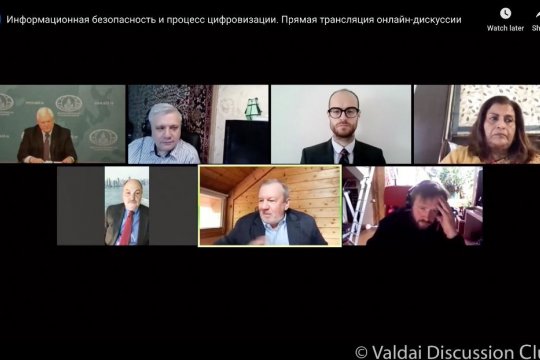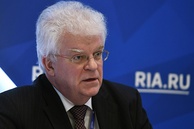While previous epidemics snuffed out not thousands, but hundreds of thousands of lives, the system of digital communication we have today ensures a quick exchange of information, which helps avoid the many risks associated with the coronavirus outbreak. The pandemic will spur the digitalization process, and ensuring information security will become an urgent challenge for all. This forecast was shared by all participants in the “Information Security and the Digitalization Process: Between Development and Fears” roundtable, organized by the Valdai Club.
According to Vladislav Onishchenko, the first deputy head of the Analytical Center under the Government of the Russian Federation, what we have now is a soft version of quarantine measures, because thanks to information technology, many communities have organized themselves and maintain their normal lifestyle. Moreover, this has helped avoid social tension and the degradation of social life. But the flip side of this, however, is that the switch to a remote access mode makes information security all the more relevant as hacking, cybercrime, cyberterrorism, meddling in internal affairs and privacy are becoming increasingly dangerous.
“In 1998, Russia was the first to warn the world about the dangers of an emerging cyber pandemic.” (Andrey Krutskikh)
“Cyber weapons are easily making their way into the global network; malicious codes are being sold, complicating their tracking,” added Andrey Yarnykh, head of GR and strategic projects at Kaspersky Lab. Personal data will increasingly be used against people, and Big Data will make cyberattacks more targeted. Internet sales will put at risk private households and big production chains alike. Methods of influencing public opinion, cyber espionage and cyber-sabotage will become more accessible thus making anti-virus campaigns much more expensive.
“There will be no safe haven; the whole world will be under attack,” Andrey Yarnykh concluded, pointing to cross-border measures as the only means of fighting cybercrime.
However, when faced with the threat, countries, instead of fighting this threat together, may be tempted to use it to achieve their own goals.
“As we know from history, I regret to say that trouble does not come alone,” said Andrey Krutskikh, special representative of the President of the Russian Federation for international cooperation in the field of information security. He believes that a “bio-pandemic” will be followed by a “cyber-pandemic.” The expert noted that some countries’ proclaimed right to deliver preventive strikes on the critical infrastructure of their potential adversaries is dangerously fraught with drawing mankind into a “cyber confrontation or even war.”
“In 2018, the UN adopted a resolution, proposed by Russia that outlined the rules and set up the so-called open-ended group.” (Andrey Krutskikh)
Andrey Krutskikh believes that a cyber pandemic cannot effectively be tackled by acting from a position of strength and by imposing one’s will on a minority. He emphasizes that the Russian program of action, proposed in 1998, involves recognizing the global nature of the problem, the participation of all (civil society, business, and the scientific community) and conflict prevention.
During the discussion, the participants answered questions from the attending journalists.
International Affairs: How will the pandemic make it possible to regulate the information space?
Andrey Krutskikh: All countries and mankind as whole will emerge from the coronavirus pandemic being even more dependent on cyber technologies and the Internet. The challenge is to make the Internet more efficient and less vulnerable. The Internet is not someone’s personal plaything or something that belongs to one country or a group of countries. The Internet should belong to the international community, be truly internationalized and remain under objective international oversight to prevent any repetition of past mistakes, and organize the most efficient work in the future to combat global threats.
I foresee that the future of the Internet will be decided by the entire world community, taking into account all actors (civil society, business, and the scientific community). It is important to maximize its security and fight against everything that is illegal. Mankind is still unable to solve the very obvious and universally recognized problem of child pornography. After all, this is something all experts and politicians agree on. This is a monstrous crime. And still, it is all over the Internet. And how long can we tolerate this? And how many decades do we need to solve at least this one problem?
We need to speed up our effort, primarily within the UN framework, to really internationalize and secure the Internet, and we already have all the necessary mechanisms in place to do this. All these aspects of the future Internet are already being addressed as part of the open-ended group, and I believe that this work will intensify as we move on.
Vladislav Onishchenko: Because we really have no idea just how technologies will develop amid the explosive growth that we are witnessing today, we can only be sure that they will develop rapidly and, most likely, we will obtain all kinds of new technological solutions aimed at making [these technologies] simple and accessible to everyone because this is the best way to ensure a fairly quick payback. We need accessible and relatively cheap Internet for every person on Earth (and not only for a person, but also for the industry and machines).
We will come across the very same situation as before. Countries will try to keep the Internet in check as they combat the effects of the pandemic. Most likely, the technological explosion will be so big and will bring about technologies so different in their essence and form that we will have an even higher degree of decentralization and independence of technological solutions. I don’t think that we will have a more regulated digital environment than before, because we cannot even imagine what technological challenges and opportunities we are going to face.
“There is a rapid process of transformation going on now that will not end with the pandemic” (Vladislav Onishchenko)
read more in our Telegram-channel https://t.me/The_International_Affairs

 11:17 15.04.2020 •
11:17 15.04.2020 •



























